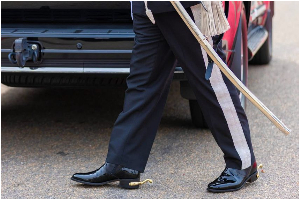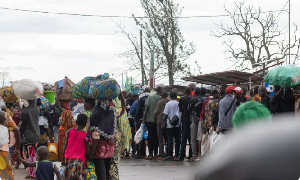Ghana's soccer team remains alive at the World Cup, but off the field things have not been pretty. The country's national soccer federation stands accused of corruption after British journalists exposed an apparent agreement to participate in games organized by match-fixers. In a six-month undercover investigation by the Daily Telegraph and Channel 4’s Dispatches, reporters posing as match sponsors approached Christopher Forsythe, a FIFA-accredited agent, and Obed Nketiah, a senior official of Ghanaian soccer, who were caught on camera promising to place Ghana in matches overseen by bribed referees.
The president of the Ghana Football Association, Kwesi Nyantakyi, is also accused of agreeing to have his team comply with the fixing. In a damning video, Nyantakyi agreed to allow “Diamond Capital,” a fake investment firm that was part of the reporters’ cover, to arrange matches and appoint referees, which directly violates FIFA’s rules prohibiting third-party referees (FIFA has its own committee to assign sanctioned officials). According to the contract agreed on in the video, Ghana would make $170,000 for every match in which the team participated.
Ghana denies the allegations, naturally. The best defense seems to be playing dumb, with Forsythe claiming any promises he made in the video were the result of his own naivete. I’ll let you judge the validity of that explanation for yourself. A few of Forsythe’s “naive” statements, per the Telegraph:
"You [the company] will always have to come to us and say how you want it to go … the result,” said Mr. Forsythe. “That’s why we will get the officials that we have greased their palms, so they will do it. If we bring in our own officials to do the match … You’re making your money.
"You have to give them [the referees] something …They are going to do a lot of work for you, so you have to give them something,” said Mr. Nketiah, who is also the chief executive of the Ghanaian football club Berekum Chelsea and sits on the management committee of the Ghana U20 national team.
Mr. Forsythe said that match fixing was “everywhere” in football and that he could even arrange rigged matches between Ghana and British teams. “The referees can change the matches every time. Even in England it does happen,” he said. Following the meeting in London, the representative of the investment firm asked if his company could be sure their approach would work.
Mr. Forsythe replied: “We will always choose associations/countries that we think we can corrupt their officials for all our matches.”
He listed a number of African and European countries, adding “we can look for match officials who will sing to our tune.”
These revelations, of course, come as the Black Stars prepare for their final match of the World Cup’s group stage, needing a win tomorrow against Portugal to keep alive their chances of advancing to the knockout round. It's not like the team needed this: Reports surfaced this week that players were threatening to forfeit the match because they had not received the bonus payments they had been promised for qualifying. According to local outlets, each player was owed $75,000, but had not been compensated three weeks and two matches into the tournament.
It’s unclear how serious these threats were. In a press conference in Brasilia, midfielder/attacker Christian Atsu seemed to backtrack:
Our captain spoke to us and now we are only focused on the game. We are in the biggest tournament in the World. Even if we don't get the money we would put this all behind us because the competition is what is important. We had taken a decision but now we took it back and we decided to play this game. We love our nation and want to perform our best. It would be bad if we lose because people would think that it had anything to do with the money. Still, you couldn’t blame Ghana’s players if money worries were a distraction on and off the pitch. The football-association scandal seems of a piece with Ghanaian politics: The government faces little to no accountability and received a 46 out of 100 on Transparency International’s Corruption Index. The players had good reason to question whether the country’s kleptocracy would uphold its promise of compensation.
In any case, Ghana’s government took the threat seriously. Wednesday morning, Bloomberg News reported, President John Dramani Mahama sent a plane to Brazil carrying more than $3 million in cash for the players. No word yet on how the match-fixing payments were supposed to have been transported. Segway, perhaps?
To contact the writer of this article: Kavitha A. Davidson at kdavidson19@bloomberg.net.
Sports Features of Thursday, 26 June 2014
Source: kavitha a. davidson













